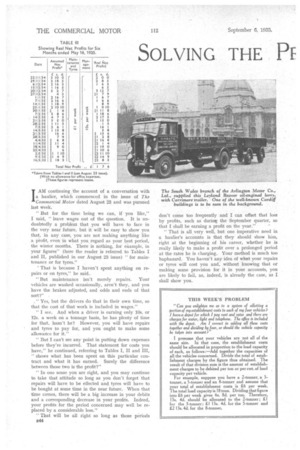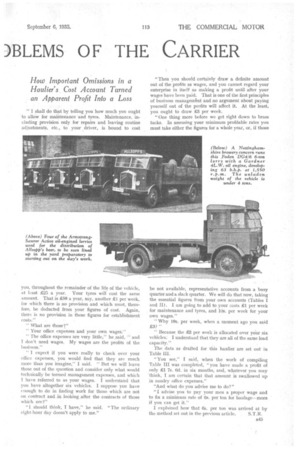SOLVING THE PE )13LEMS OF THE CARRIER
Page 58

Page 59

If you've noticed an error in this article please click here to report it so we can fix it.
How Important Omissions in a Haulier's Cost Account Turned an Apparent Profit Into a Loss
JAM continuing the account of a conversation with a haulier, which commenced in the issue of The Commercial Motor dated August 23 and was pursued last week.
" But for the time being we can, if • you like," I said, "leave wages out of the question. It is undoubtedly a problem that you will have to face in the very near future, but it will be easy to show you that, in any case, you are not making anything like a profit, even in what you regard as your best period, the winter months.. There is nothing, for example, in your figures" (here the reader is referred to Tables I and II, published in our August 23 issue) "for maintenance or for tyres."
' That is because I haven't spent anything on repairs or on tyres," he said.
"But maintenance isn't merely repairs. Your vehicles are washed occasionally, aren't they, and you have the brakes adjusted, and odds and ends of that sort?"
Yes, but the drivers do that in their own time, so that the cost of that work is included in wages."
" I see. And when a driver is earning only 10s. or 12s. a week on a tonnage basis, he has plenty of time for that, hasn't he However, you will have repairs and tyres to pay for, and you ought to make some allowance for it." , "But I can't see any point in putting down expenses before they're incurred. That statement for costs you have," he continued, referring to Tables I, II and III, "shows what has been spent on this particular contract and what it has earned. Surely the difference between those two is the profit?"
"In one sense you are right, and you may continue to take that attitude so long as you don't forget that repairs will have to be effected and tyres will have to be bought at some time in the near future. When that time comes, there will be a big increase in your debits and a corresponding decrease in your profits. Indeed, your profits for the period concerned may well be replaced by a considerable loss."
"That will be all right so long as those periods 3344 don't come too frequently and I can offset that loss by profits, such as during the September quarter, so that I shall be earning a profit on the year."
"That is all very well, but one imperative need in a haulier's accounts is that they should show him, right at the beginning of his career, whether he is really likely to make a profit over a prolonged period at the-rates he is charging. Your method is much too haphazard. You haven't any idea of what your repairs or tyres will cost you and, without knowing that or making some provision for it in your accounts, you are likely to fail, as, indeed, is already the case, as I shall show you. " I shall do that by telling you how much you ought to allow for maintenance and tyres. Maintenance, including provision only for repairs and leaving routine adjustments, etc., to your driver, is bound to cost you, throughout the remainder of the life of the vehicle, at least £25 a year. Your tyres will cost the same amount. That is 250 a year, say, another 21 per week, for which there is no provision and which must, therefore, be deducted from your figures of cost. Again, there is no provision in these figures for establishment costs."
" What are those?"
" Your office expenses and your own wages:' "The office expenses are very little," he said. "and I don't need wages. My wages are the profits of the business."
" I expect if you were really to check over your office expenses, you would find that they are much more than you imagine," I said. "But' we will leave those out of the question and consider only what would technically be termed manapment expenses, and which have referred to as your wages. I understand that you have altogether six vehicles. I suppose you have enough to do in finding work for those which are not on contract and in looking after the contracts of those which are?"
"I should think, I have," he said. "The ordinary eight-hour day doesn't apply to me."
"Then you should certainly draw a definite amount out of the profits as wages, and you cannot regard your enterprise in itself as making a profit until after your wages have been paid. That is one of the first principles of business management and no argument about paying yourself out of the profits will affect it. At the least, you ought to draw 23 per week.
"One thing more before we get right down to brass tacks. In assessing your minimum profitable rates you must take either the figures for a whole year, or, if those be not available, representative accounts from a busy quarter and a slack quarter. We will do that now, taking the essential figures from your own accounts (Tables I and II). I am going to add to your costs £1 per week for maintenance and tyres, and 10s. per week for your own wages."
" Why 10s. per week, when a moment ago you said £3? "
"Because the 23 per week is allocated over your six vehicles. I understand that they are all of the same load capacity."
The data as drafted for this haulier are set out in Table III.
"You see," I said, when the work of compiling Table III was completed, "you have made a profit of only £1 7s. 6d. in six months, and, whatever you may 'think, I am certain that that amount is swallowed up in sundry office expenses."
"And what do you advise me to do?"
"I advise you to pay your men a proper wage and to fix a minimum rate of 6s. per ton for haulage—more if you can get it."
I explained how that 6s. per ton was arrived at by
the method set out in the previous article. S.T.R.




























































































